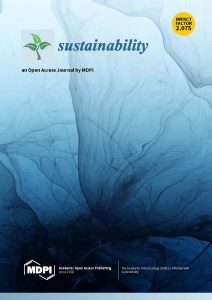Sustainability journal: Call for contributions
 Today, most large port hubs include the circular economy transformation challenge, together with smart digitalization and Internet of Things (IoT), in their strategic priorities. Some port authorities even express the ambition for their port to become a maritime circular hotspot. However, many ports do not seem to have progressed beyond incremental, small-scale sustainable innovations, or the support of rather fragmented sustainability initiatives. However, what really takes ports to the next level in terms of preparing for and implementing circular business has hardly been addressed in research so far.
Today, most large port hubs include the circular economy transformation challenge, together with smart digitalization and Internet of Things (IoT), in their strategic priorities. Some port authorities even express the ambition for their port to become a maritime circular hotspot. However, many ports do not seem to have progressed beyond incremental, small-scale sustainable innovations, or the support of rather fragmented sustainability initiatives. However, what really takes ports to the next level in terms of preparing for and implementing circular business has hardly been addressed in research so far.
Challenges are complex, since ports do not only have to reconsider their own core activities but also their role in the supply chain of shippers, to lift themselves out of the linear lock-in. Opportunities are also created, as Fusco Girard (2013) argued: “Economic circuits are shortened and the local economy is strengthened through integration” (Fusco Girard, L., 2013, Toward a smart sustainable development of port cities/areas: The role of the “Historic Urban Landscape” approach. Sustainability, 5(10), 4329-4348.). This author put forward that a port’s circularization process consists of an industrial, urban, and city-territorial or regional symbiosis (Fusco Girard, 2013).
However, non-business (government, cluster organizations, etc.) initiatives or support are often behind circular pilot projects, and as much as it can serve as an engine for innovation towards sustainable port development, port authorities and businesses finally need to embrace circular learning and turn these projects into sustainable business models, i.e., with the design of the value creation, delivery, and capture mechanisms employed (Teece, 2010). This strategic change or refocus requires new insights into innovative governance and business frameworks, the link between strategy and commercially viable business models, systems innovation, intensified stakeholder collaboration and co-creation, altered traffic segments and hinterland focus, etc.
PortEconomics member Elvira Haezendonck is co-editing this Special Issue in Sustainability and is calling for papers on research into circular strategies and sustainable (business) models for ports. Theoretical as well as empirical, and quantitative as well as qualitative contributions are welcomed. Ultimately, proposed papers for this Special Issue may cover a broad range of strategies and policies, as long as the focus is on supporting ports and port authorities in their circular transition.
Manuscript Submission Information
Manuscripts should be submitted online at www.mdpi.com by registering and logging in to this website. Once you are registered, click here to go to the submission form. Manuscripts can be submitted until the deadline. All papers will be peer-reviewed. Accepted papers will be published continuously in the journal (as soon as accepted) and will be listed together on the special issue website. Research articles, review articles as well as short communications are invited. For planned papers, a title and short abstract (about 100 words) can be sent to the Editorial Office for announcement on this website.
Submitted manuscripts should not have been published previously, nor be under consideration for publication elsewhere (except conference proceedings papers). All manuscripts are thoroughly refereed through a single-blind peer-review process. A guide for authors and other relevant information for submission of manuscripts is available on the Instructions for Authors page. Sustainability is an international peer-reviewed open access semimonthly journal published by MDPI.
Please visit the Instructions for Authors page before submitting a manuscript. The Article Processing Charge (APC) for publication in this open access journal is 1700 CHF (Swiss Francs). Submitted papers should be well formatted and use good English. Authors may use MDPI’s English editing service prior to publication or during author revisions.











